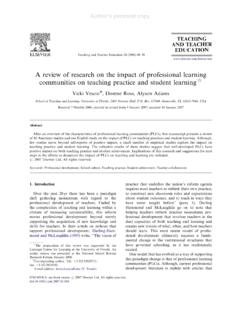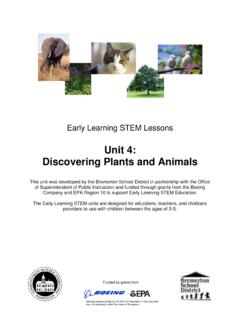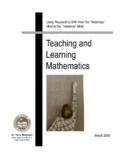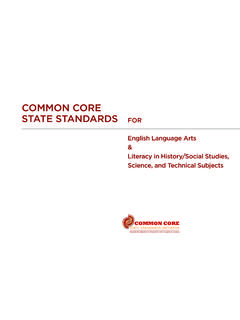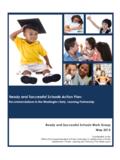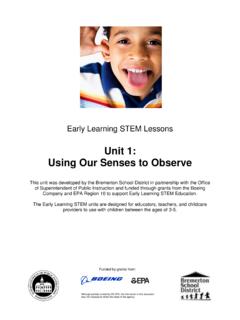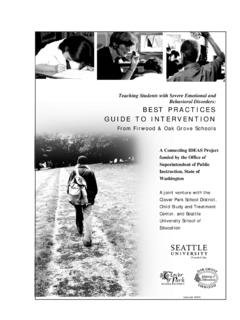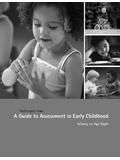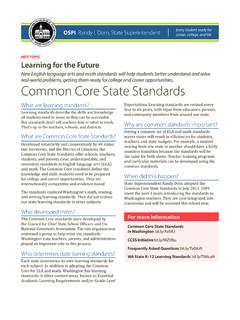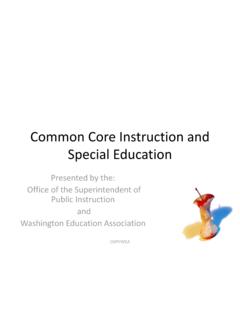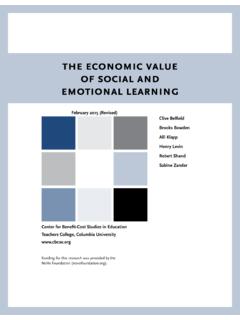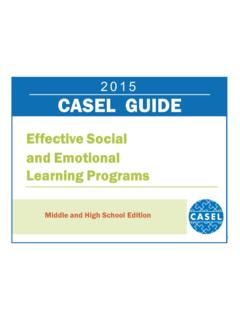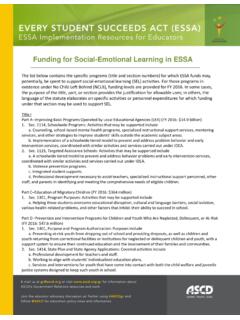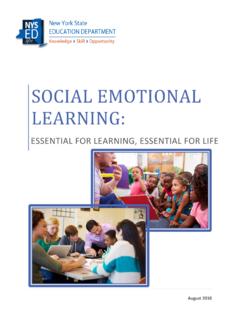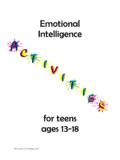Transcription of Addressing Social Emotional Learning in …
1 Addressing Social Emotional Learning in Washington s K-12 Public Schools October 1, 2016 Report by the Social Emotional Learning Benchmarks Workgroup Addressing Social Emotional Learning in Washington s K-12 Public Schools Page 1 Page | 1 Table of Contents EXECUTIVE SUMMARY .. 2 Washington s K-12 Social Emotional Learning Standards and Benchmarks .. 3 BACKGROUND .. 4 Legislation .. 4 Social Emotional Learning Benchmarks Workgroup .. 4 Stakeholder Feedback .. 4 Social Emotional Learning .. 6 What is Social Emotional Learning ? .. 6 Why is Social Emotional Learning Important? .. 6 History and Future of Social Emotional Learning .. 8 RECOMMENDATIONS .. 9 Social Emotional Learning Framework .. 9 Guiding Principles .. 9 Standards and Benchmarks.
2 10 Implementation .. 12 Universal Design for Learning .. 12 Emphasis on Equity .. 13 Holistic Approach .. 13 Community Input Process .. 13 CONCLUSION .. 14 GLOSSARY .. 15 ACKNOWLEDGEMENTS .. 16 APPENDIX .. 17 Appendix 1. Committee Membership .. 17 Appendix 2. Stakeholder Engagement and Feedback Plan .. 19 Addressing Social Emotional Learning in Washington s K-12 Public Schools Page 2 EXECUTIVE SUMMARY This report is the culmination of the work completed by the Social Emotional Learning Benchmarks Workgroup (SELB), containing background information, research, and recommendations regarding Social Emotional Learning (SEL). Final recommendations consist of a statewide SEL Framework (guiding principles, standards, and benchmarks) for K-12 students, as well as actionable next steps to further develop SEL in Washington.
3 Social Emotional Learning is broadly understood as a process through which people build awareness and skills in managing emotions, setting goals, establishing relationships and making responsible decisions, leading to success in school and in Research shows SEL on a large scale supports better performing and more positive school The Social Emotional Learning Benchmarks Workgroup proposes to the Legislature a statewide SEL Framework, including guiding principles, standards, and benchmarks that provide the foundation and system for effective SEL programming. The guiding principles, which consists of (1) professional Learning ; (2) school/family/community partnerships; and (3) cultural responsiveness, ensure SEL in the classroom is culturally competent and inclusive across all schools and communities.
4 Standards and benchmarks outline key SEL skills, which strive to develop interpersonal and intrapersonal competencies. By defining and incorporating SEL at a systems level, we build a foundation to support academic and life-long achievement for students. By soliciting wide input and rigorously evaluating SEL in practice, the proposed Washington Social Emotional Learning Framework can support positive, equitable school environments in which all students learn the skills needed to be prepared for career, college, and life. To implement SEL effectively and equitably schools will need to (1) start by evaluating and building school and classroom environments that are conducive to SEL; (2) incorporate principles of universal design for Learning when adapting SEL curricula to their unique climate; (3) emphasize equity in the selection and implementation of curriculum; and (4) take a holistic approach, understanding that each person (child and adult) will start at different places and progress in different ways along an SEL continuum.
5 To ensure school districts have tools to do this work, we recommend the SELB Workgroup continues as a state level advisory committee. The future workgroup will need to develop indicators reflective of Washington s unique and diverse cultural heritage that are aligned to the proposed SEL standards and benchmarks, and develop resources to support districts and schools in the implementation process. The workgroup recommends the following to the Legislature, with the guidance and support of the Office of Superintendent of Public Instruction: 1. Adopt the proposed Social Emotional Learning Framework, including the guiding principles, standards, and benchmarks for K-12 students in Washington. 2. Continue to fund the Social Emotional Learning Benchmarks Workgroup (SELB) as a state level advisory committee.
6 1 CASEL. (2015). What is Social and Emotional Learning ? Retrieved from: ; Oakland Unified School District. (2016). Oakland SEL Briefing Notes. Retrieved from: 2 Elias. (1997). Promoting Social and Emotional Learning : Guidelines for educators. Alexandria, VA: Association for Supervision and Curriculum Development; Zins, Weissberg, Wang, & Walberg. (2004). Building academic success on Social and Emotional Learning : What does the research say? Teachers College Press; Durlak., Durlak, Weissberg, Dymnicki, Taylor, & Schellinger. (2011). The impact of enhancing students Social and Emotional Learning : A meta-analysis of school based universal interventions. Child Development, 872 (1), 1-29.
7 Addressing Social Emotional Learning in Washington s K-12 Public Schools Page 3 Page | 3 Washington s K-12 Social Emotional Lear ning Standards and Benchmarks SELF Social STANDARD 1 SELF-AWARENESS Individual has the ability to identify and name one s emotions and their influence on behavior. STANDARD 4 Social AWARENESS Individual has the ability to take the perspective of and empathize with others from diverse backgrounds and cultures. BENCHMARK 1A Demonstrates awareness and understanding of one s emotions. BENCHMARK 4A Demonstrates awareness of other people s emotions, perspectives, cultures, language, history, identity, and ability. 1B Demonstrates knowledge of personal strengths, areas for growth, culture, linguistic assets, and aspirations.
8 4B Demonstrates an awareness and respect for one s similarities and differences with others. 1C Demonstrates awareness and understanding of family, school, and community resources and supports. 4C Demonstrates an understanding of the Social norms of individual cultures. STANDARD 2 SELF-MANAGEMENT Individual develops and demonstrates the ability to regulate emotions, thoughts, and behaviors in contexts with people different than oneself. STANDARD 5 Social MANAGEMENT Individual has the ability to make safe and constructive choices about personal behavior and Social interactions. BENCHMARK 2A Demonstrates the skills to manage and express one s emotions, thoughts, impulses, and stress in constructive ways. BENCHMARK 5A Demonstrates a range of communication and Social skills to interact effectively with others.
9 2B Demonstrates constructive decision-making and problem solving skills. 5B Demonstrates the ability to identify and take steps to resolve interpersonal conflicts in constructive ways. 5C Demonstrates the ability to engage in constructive relationships with individuals of diverse perspectives, cultures, language, history, identity, and ability. STANDARD 3 SELF-EFFICACY Individual has the ability to motivate oneself, persevere, and see oneself as capable. STANDARD 6 Social ENGAGEMENT Individual has the ability to consider others and a desire to contribute to the well-being of school and community. BENCHMARK 3A Demonstrates the skills to set, monitor, adapt, persevere, achieve, and evaluate goals. BENCHMARK 6A Demonstrates a sense of Social and community responsibility.
10 3B Demonstrates problem-solving skills to engage responsibly in a variety of situations. 6B Demonstrates the ability to work with others to set, monitor, adapt, achieve, and evaluate goals. 3C Demonstrates awareness and ability to speak on behalf of personal rights and responsibilities. 6C Demonstrates effective strategies to contribute productively to one s school, workplace, and community. Addressing Social Emotional Learning in Washington s K-12 Public Schools Page 4 BACKGROUND Le gisla tion In Washington, the Legislature intends to continue to strengthen and modify the structure of the entire K-12 educational system, including non-basic education programmatic elements, in order to build the capacity to anticipate and support potential future enhancements to basic education as the educational needs of our citizens continue to evolve.
